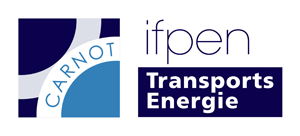 IC powertrains
IC powertrains
OUR solutions
In order to reduce the environmental impact of IC engines, IFPEN is working to increase their efficiency and reduce pollutant emissions. They also aim to identify low-carbon fuels (natural gas, biofuels and synthetic fuels or E-Fuels and hydrogen) with the most favorable energy and environmental performance and to optimize their use in engines.
IFPEN's fields of expertise cover:
• The development of high-performance IC engines
• The use of very low carbon fuels and hydrogen
• The qualification of emissions and the development of post-treatment systems
• The development of modeling and simulation software
High-performance powertrain: innovative combustion systems
IFPEN is mainly working on spark-ignition powertrains (gasoline, natural gas and hydrogen) and is aiming for breakthrough efficiency gains, enabling CO2 emissions from gasoline-powered vehicles, MHEV (Mild Hybrid Electric Vehicle) or PHEV (Plug-in Hybrid Electric Vehicle), to be reduced by 10% by 2025 and by around 20% by 2030, while ensuring that an efficient pollution control system is maintained throughout the entire operating range.
Gasoline
IFPEN has developed SwumbleTM, a new generation of combustion system to improve the thermodynamic efficiency of gasoline engines in stoichiometric operation. Its innovative internal aerodynamics, particularly optimized for Miller cycles with 2 and 4 valves per cylinder, with high dilution by the EGR, makes it possible to:
• obtain a maximum effective efficiency of over 43%, thanks to a very good level of turbulence at the time of ignition, whatever the cycle at intake
• reach very high compression ratios, in excess of 13:1
• reduce particulate emissions significantly over the entire emission spectrum, from 10 nm

> To find out more about SWUMBLE™ concept: high efficiency gasoline engine for future hybrid vehicles
Innovations concerning the control of the air loop or the combustion system are being studied as part of the European Phoenice project. Starting in 2021, this project aims to improve the efficiency and emissions of a plug-in hybrid vehicle. At lower TRLs, the European Eagle program and collaborative studies have made it possible to determine the efficiency and emissions potential of lean-burn gasoline engines.
Natural gas
SwumbleTM technology is being adapted for natural gas fueling for heavy-duty applications, including the European LongRun project.
Hydrogen
IFPEN is developing key technologies relating to combustion systems, the air loop and control.
>Learn more about IFPEN solutions for hydrogen mobility
Very low-carbon fuels: unique expertise
IFPEN offers a unique integrated approach to the study of different fuels: Conventional fuels, biofuels and synthetic fuels or E-Fuels, natural gas, hydrogen and others.
This approach can be applied to the entire value chain, for the automotive, aeronautical and maritime sectors:
- Formulation: Transformation and compliance with specifications for conventional fuels and biofuels synthetic fuels, adaptation to use cases...
- Impact on renewable energies: Oxidation stability, cold resistance, compatibility between materials and fuel, etc.
- Modeling of physico-chemical properties
- Engine performance (efficiency, pollutant emissions) taking into account the associated environmental and economic constraints
Sustainable fuels, made from bio-based raw materials or decarbonized electricity, play an essential role in reducing the impact of transportation on greenhouse gas emissions. They are compatible with existing IC engines and can help ensure a sustainable transition to an increasingly electrified fleet. They are also a relevant solution for the long-term decarbonization of long-distance transport, whether by land, air or sea, where widespread electrification is more difficult to deploy.
IFPEN's work enables us to qualify the impact of fuel on recent engine technologies, particularly those developed by IFPEN. The fuel can also contribute significantly to improving efficiency (gain > 1%), in particular by increasing the RON (Research Octane Number) above 100.
IFPEN's expertise is used to:
• Study the compatibility of low-carbon fuels with existing engines (engine systems, materials and lubricants), their aging mechanisms and their oxidation and combustion modes
• Identify the complex mechanisms of oxidation of fuels, in particular bio or E-fuels (properties of use, stability of products over time, impact on emissions, etc.)
• Develop numerical tools to optimize their combustion
• Improve the understanding and modeling of fuel oxidation phenomena using machine learning and artificial intelligence methods
Very low-carbon fuels: unique expertise
Emissions qualification
IFPEN is able to qualify vehicle emissions in a precise and reliable manner. Its expertise is based on:
• cutting-edge knowledge of the physicochemical phenomena governing the formation and evolution of pollutants
• advanced command of measurement techniques
Within the framework of the Ademe Rhapsodie and Rhapsodie2 projects, IFPEN has provided a comprehensive view of regulated and non-regulated pollutant emissions from the exhaust of vehicles representative of the French vehicle fleet.
IFPEN is also developing new tools capable of further improving the qualification of pollutant emissions, thus meeting many of the needs expressed by stakeholders involved in improving air quality.
After-treatment systems
IFPEN's contribution to after-treatment technologies also includes the development of automotive catalysts. Its capacity to control extremely complex active systems enables IFPEN to optimize the implementation of catalysts directly within the exhaust system.
Lastly, IFPEN is developing simulation tools for the dimensioning and control of emission after-treatment systems, an essential building block for manufacturers in their engine development activities.
Modeling and simulation
Hydrogen combustion modeling
As a forerunner in the use of hydrogen in internal combustion engines, IFPEN has naturally developed new advanced modeling tools that allow the reliable and predictive simulation of these new engines.
Internal combustion modeling
IFPEN has extensive experience in developing models for internal combustion engines. In relation to the CONVERGE™ Computational Fluid Dynamics (CFD) software, its collaboration with Convergent Science Inc. has enabled the implementation of automotive combustion and aftertreatment models developed by its research teams. IFPEN is thus able to offer fully predictive CFD software and provide manufacturers with fast and easy-to-use solutions for the 3D numerical simulation of reactive flows in engines.
Simulation models in SaaS mode
IFPEN is developing LES (Large-Eddy Simulation) models, which it uses in its research programs. Their potential to help manufacturers improve the efficiency of IC engines has prompted IFPEN to propose an enhancement of these tools in the CONVERGE™ software of its partner CSI (see above) and through the ACCESS-LES platform, via a solution in SaaS (Software as a Service) mode, which guarantees rapid access to advanced computing resources (computing power, data storage, advanced post-processing of simulation results) and a high degree of flexibility of use.
Simulation of complex systems
In order to address new regulations, particularly the integration of RDEs (Real Driving Emissions), and technological developments such as electrification, the use of simulation to specify and validate powertrain design for various usages is gathering pace all the time with the possibility of reducing time and cost scales. IFPEN has spent the last fifteen years or so working on a system modeling approach, applied to the entire new powertrain design chain and offers three model libraries, co-developed with Siemens Digital Industries Software and integrated into its Simcenter Amesim™ platform:
- IFP-Engine: detailed IC engine modeling
- IFP-Exhaust: detailed exhaust gas after-treatment system modeling
- IFP-Drive: global powertrain and vehicle modeling.











